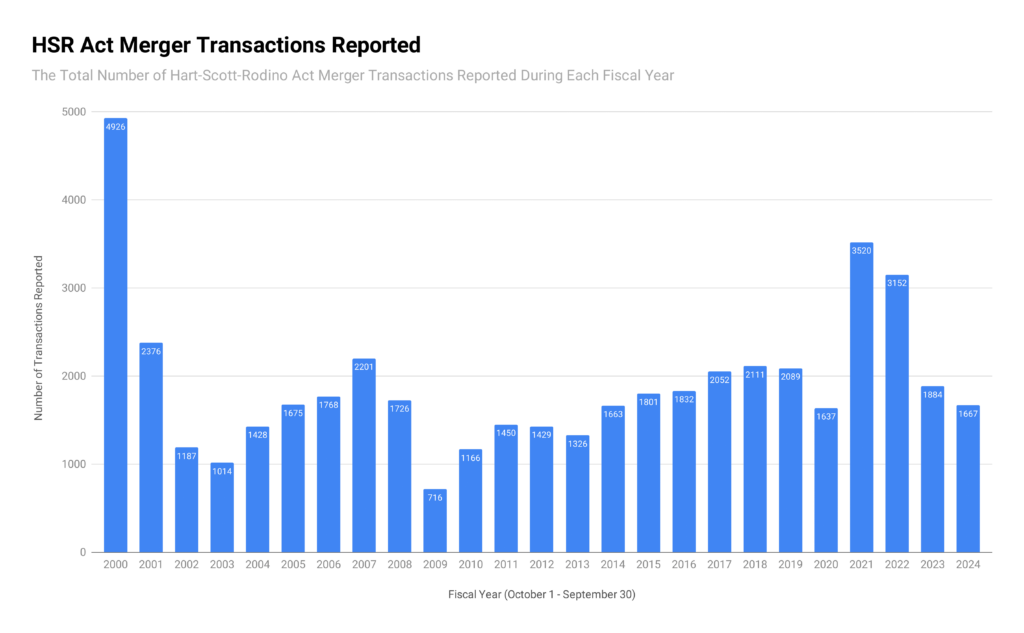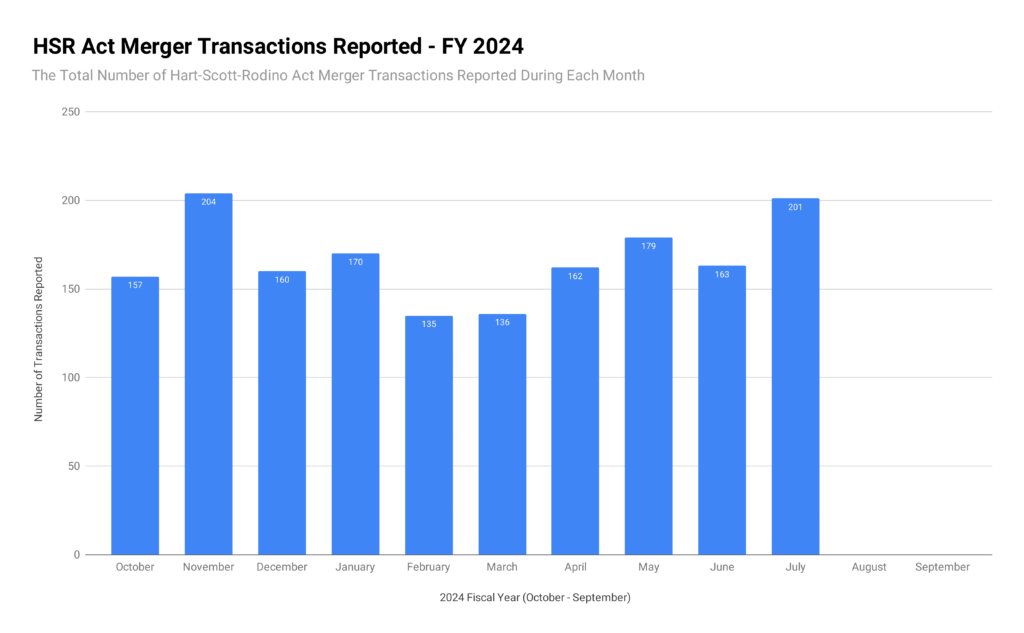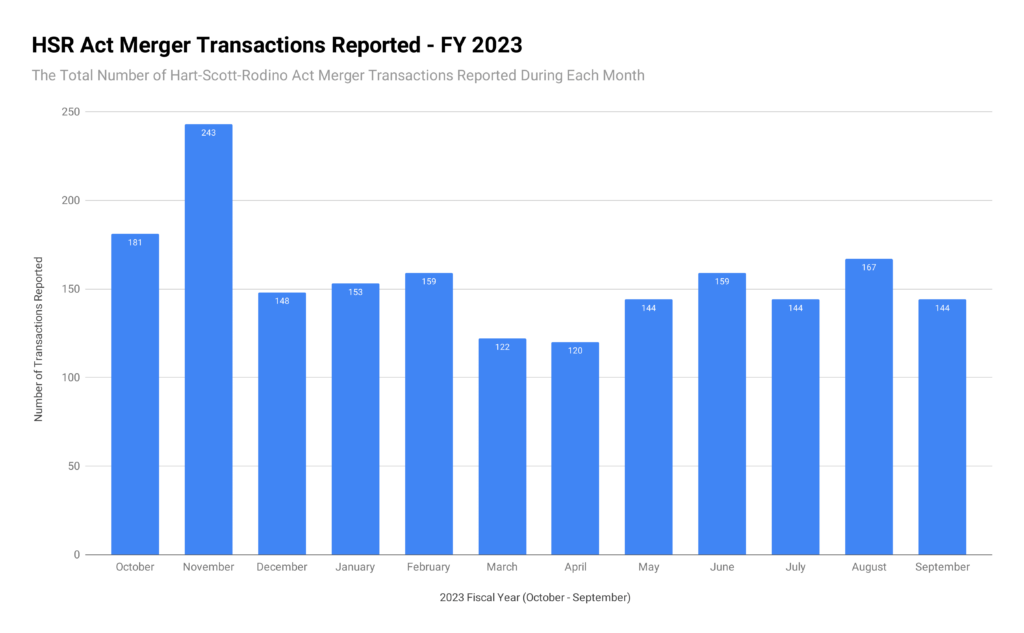[EDRM’s Editor’s Note: This article was first published here on August 29, 2024, and EDRM is grateful to Rob Robinson, editor and managing director of Trusted Partner ComplexDiscovery, for permission to republish.]
ComplexDiscovery’s Editor’s Note: This article provides a detailed analysis of the July 2024 HSR transaction data and key economic indicators, emphasizing their impact on the eDiscovery sector. It explores the implications of GDP growth, personal income trends, and inflationary pressures on legal budgets and strategic spending within various industries. The insights are particularly valuable for legal professionals navigating the complex landscape of mergers and acquisitions (M&A) and regulatory compliance.
Background Note: The Hart Scott Rodino Act (HSR Act), a pivotal federal law, mandates companies to notify the Federal Trade Commission (FTC) and the Department of Justice (DOJ) before finalizing mergers or acquisitions involving certain assets or voting securities. This notification is part of the FTC and DOJ Premerger Notification Program, designed to enable a thorough review of proposed transactions for potential antitrust issues. For professionals in cybersecurity, information governance, and legal discovery operating within the eDiscovery ecosystem, tracking the monthly HSR transaction data, now enriched in this update with key economic indicators like GDP growth and corporate profits, offers critical insights. This enhanced perspective helps in understanding the broader economic implications of merger and acquisition activities and their potential impact on the eDiscovery landscape.
July 2024 HSR Transactions: What GDP Growth and Economic Trends Mean for eDiscovery
In the rapidly evolving mergers and acquisitions (M&A) landscape, the Hart-Scott-Rodino (HSR) Act transactions and key economic trends are critical for eDiscovery professionals. This brief analysis explores the latest HSR transaction data alongside economic indicators such as GDP and personal income reports, highlighting their direct and indirect impacts on the eDiscovery sector. By understanding these interconnected factors, legal professionals can better navigate economic pressures, manage risks, and leverage opportunities for their organizations and clients.
HSR Transactions Overview
The most recent data from the Premerger Notification Office offers insights into the trends in HSR Act transactions over the past months, shedding light on the fluctuating nature of M&A activities and their implications for eDiscovery spending and legal strategies.
In July 2024, HSR transactions reached 201, a notable increase from June’s 163 and May’s 179. This upward trend contrasts with the dips seen earlier in the year, such as the 136 transactions recorded in March. The November 2023 peak of 204 transactions still stands as a significant marker of M&A activity during the past year. These variations in transaction volumes reflect broader economic conditions and regulatory environments, underscoring the need for eDiscovery professionals to stay agile and responsive to changing demands.
Economic Trends and Their Implications
Economic indicators from the U.S. Bureau of Economic Analysis (BEA) provide a comprehensive view of the current landscape, offering valuable insights for the eDiscovery sector.
The second quarter of 2024 saw a robust increase in real GDP, which grew at an annual rate of 3.0%, up from 1.4% in the first quarter. This acceleration was driven by increases in consumer spending, private inventory investment, and nonresidential fixed investment. However, a downturn in residential fixed investment slightly offset these gains. Current-dollar GDP rose by 5.5%, reaching $28.65 trillion, an upward revision reflecting more complete data. Corporate profits rebounded with an increase of $57.6 billion, contrasting with the $47.1 billion decrease seen in the first quarter, particularly within domestic nonfinancial corporations.
The uptick in GDP growth and corporate profits suggests a more favorable economic environment for M&A activities, potentially leading to increased demand for eDiscovery services. However, this also comes with the challenge of managing costs, as inflationary pressures remain evident.
The interplay between economic growth, personal income, and inflation directly influences eDiscovery spending. Higher consumer spending generally leads to increased corporate revenues, which can boost legal budgets and, by extension, eDiscovery investments.
Rob Robinson, Editor and Managing Director of ComplexDiscovery.
Personal Income and Outlays Report
The BEA’s Personal Income and Outlays report for June 2024 (the latest available report published in July) highlights continued growth in personal income and consumer spending. Personal income increased by $50.4 billion (0.2%), with disposable personal income (DPI) and personal consumption expenditures (PCE) also showing moderate growth of 0.2% and 0.3%, respectively.
The PCE price index, a key measure of inflation, increased by 2.5% year-over-year, signaling ongoing inflationary pressures that could impact legal budgets. The modest increase in consumer spending suggests cautious optimism among consumers, which could translate into steady but careful investment in eDiscovery services by businesses.
Impact on eDiscovery Spending
The interplay between economic growth, personal income, and inflation directly influences eDiscovery spending. Higher consumer spending generally leads to increased corporate revenues, which can boost legal budgets and, by extension, eDiscovery investments. Conversely, economic slowdowns or inflationary pressures might prompt companies to tighten their belts, prioritizing essential legal services while cutting back on discretionary spending, including eDiscovery.
Legal departments may need to adopt more cost-effective strategies, such as optimizing workflows and negotiating better vendor terms, to manage rising costs. This is particularly relevant in sectors facing increased regulatory scrutiny or undergoing significant M&A activity, where demand for eDiscovery services remains strong despite economic pressures.
Sector-Specific Challenges
Different industries experience varying impacts from economic shifts. For example, the retail sector might reduce legal spending during periods of declining consumer confidence, affecting their ability to manage compliance and litigation. In contrast, sectors like healthcare and financial services may see increased legal demands due to regulatory changes or shifts in consumer behavior, driving higher eDiscovery spending.
Strategic spending in areas such as risk management, regulatory compliance, and essential litigation remains critical across all sectors, regardless of economic conditions. Companies engaged in significant M&A activities or facing heightened regulatory demands will continue to invest in these areas to mitigate legal risks, potentially offsetting broader trends of reduced discretionary legal budgets.
Outlook for eDiscovery Professionals
The outlook for eDiscovery professionals is shaped by steady M&A activity, cautious economic growth, and sector-specific challenges. The current trend in HSR transactions indicates a moderate increase in M&A activities, sustaining demand for eDiscovery services. However, with economic growth still facing potential headwinds and corporate profits under pressure, businesses are likely to prioritize essential services and compliance while scaling back on discretionary investments in eDiscovery.
Inflationary pressures and budget constraints will require legal departments to implement strategies to manage rising costs effectively. eDiscovery providers should focus on delivering efficient, cost-effective solutions tailored to the specific needs of different sectors. Strategic legal spending is expected to persist, particularly in industries with significant M&A activity or facing increased regulatory demands.
Looking forward, several key trends will shape the strategies and operations of eDiscovery professionals. Embracing technological advancements such as artificial intelligence (AI) and advanced analytics will be crucial for managing costs and improving efficiency. Staying informed about regulatory changes, particularly in antitrust laws, data privacy, and cross-border data transfer rules, will be essential for navigating the evolving M&A and eDiscovery landscape.
By focusing on these areas, eDiscovery professionals can better prepare for and adapt to the changing economic and regulatory environment, ensuring their organizations remain compliant, efficient, and strategically aligned with broader business goals.
Transaction Charts
Taken from the latest published Hart-Scott-Rodino (HSR) Premerger Notification monthly transactions as shared by the Federal Trade Commission (FTC) and augmented by released annual reports, the following transaction charts may be useful for law firms, legal departments, and legal service providers seeking to understand the real-time pulse rate of Hart-Scott-Rodino Act mandated transaction reviews. As these reviews may lead to Second Requests, the charts may also be useful as a baseline for considering provider assertions regarding the depth, breadth, and volume of their Second Request support for this unique type of eDiscovery during specific time frames.



*Monthly Real-Time Reporting – First Report is October 2019 (Monthly Running Report)
**Based on Annual Reporting as Represented in Final Annual HSR Transaction Reports.
Read the original release here.
News Sources
- Premerger Notification Program | Federal Trade Commission (ftc.gov)
- Gross Domestic Product (Second Estimate), Corporate Profits (Preliminary Estimate), Second Quarter 2024 | U.S. Bureau of Economic Analysis (BEA)
- Personal Income and Outlays, June 2024 | U.S. Bureau of Economic Analysis (BEA)
- June 2024 HSR Transactions, Economic Indicators, and Their Impact on eDiscovery (complexdiscovery.com)
Additional Reading
- HSR Act Reporting: A ComplexDiscovery Chronology
- FTC Annual Competition Reports (Hart-Scott-Rodino Act Reports)
Source: ComplexDiscovery OÜ
Assisted by GAI and LLM Technologies per EDRM GAI and LLM Policy.

